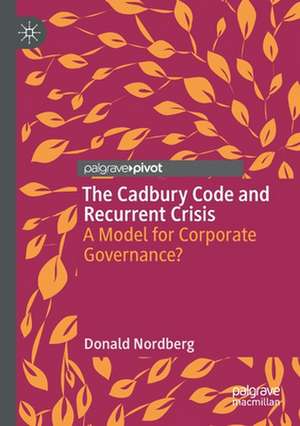The Cadbury Code and Recurrent Crisis: A Model for Corporate Governance?
Autor Donald Nordbergen Limba Engleză Paperback – 10 sep 2021
This book will be valuable reading for scholars working on business ethics, corporate governance, and business history.
| Toate formatele și edițiile | Preț | Express |
|---|---|---|
| Paperback (1) | 380.07 lei 6-8 săpt. | |
| Springer International Publishing – 10 sep 2021 | 380.07 lei 6-8 săpt. | |
| Hardback (1) | 385.47 lei 6-8 săpt. | |
| Springer International Publishing – 9 sep 2020 | 385.47 lei 6-8 săpt. |
Preț: 380.07 lei
Nou
Puncte Express: 570
Preț estimativ în valută:
72.73€ • 75.44$ • 60.64£
72.73€ • 75.44$ • 60.64£
Carte tipărită la comandă
Livrare economică 27 martie-10 aprilie
Preluare comenzi: 021 569.72.76
Specificații
ISBN-13: 9783030552244
ISBN-10: 3030552241
Pagini: 147
Ilustrații: XIX, 147 p. 2 illus.
Dimensiuni: 148 x 210 mm
Greutate: 0.23 kg
Ediția:1st ed. 2020
Editura: Springer International Publishing
Colecția Palgrave Macmillan
Locul publicării:Cham, Switzerland
ISBN-10: 3030552241
Pagini: 147
Ilustrații: XIX, 147 p. 2 illus.
Dimensiuni: 148 x 210 mm
Greutate: 0.23 kg
Ediția:1st ed. 2020
Editura: Springer International Publishing
Colecția Palgrave Macmillan
Locul publicării:Cham, Switzerland
Cuprins
Chapter 1: Success in corporate governance - or failures?.- Chapter 2: The problems and remedies in corporate governance.- Chapter 3: Codes and their contexts.- Chapter 4: Institutions, logics and power.- Chapter 5:issues contested in the UK code.- Chapter 6: Shape of the board.- Chapter 7: Ethos and explanation.- Chapter 8: Discussion.- Chapter 9: Conclusions.
Notă biografică
Donald Nordberg is Associate Professor at Bournemouth University in the UK and author of Corporate Governance: Principles and Issues. His research appears in many journals, including Corporate Governance: An International Review, Business History, and Philosophy of Management.
Textul de pe ultima copertă
“The importance of the Cadbury Committee and the codes of corporate governance that followed in shaping the current form and scope of possibility for corporate governance in the UK can hardly be underestimated. Nordberg's fascinating account of the process by which these have been shaped by individuals and institutions is a welcome examination of … what it achieved, and what it left undone.”
- Dr. Jeroen Veldman, Associate Professor, Nyenrode Business University, The Netherlands
“Professor Nordberg provides a timely and thoughtful discussion on a topic which, if anything, is even more important than it was some three decades ago. Recurrent corporate governance crises indeed indicate that the current paradigmatic approach … may provide limited assurance as to its ability to prevent further cases of governance failures.… By reflecting on current insights, urging to learn from pastmistakes, emphasising a broad discussion, and most of all, keeping an open mind to potential future solutions, Nordberg continues the great tradition of asking critical questions without necessarily providing predetermined answers.”
- Oliver Marnet, Associate Professor in Accounting, Southampton Business School, UK
"This is a fascinating book, tracing the development of the UK Corporate Governance Code and highlighting its continuity through successive crises. At the same time, it identifies areas of controversy and challenge, intriguingly suggesting that "defeated logics" are merely suspended, perhaps poised to return. Essential interdisciplinary reading for all those interested in the UK's corporate governance system."
- Andrew Johnston, Professor of Company Law and Corporate Governance, School of Law, University of Warwick, UK
This book raises questions about a hallmark mechanism of corporate governance – the use of codes of practice. It undertakes a critical examination of the origins and development of the UK code of corporate governance, which influenced codes devised around the world and practices of organisations well beyond the world of corporations listed on stock exchanges. Much lauded as a model of good governance, its core principles have persisted for almost 30 years. Yet during that time repeated crises in corporate governance have arisen, suggesting that it has not fully addressed the problem it was meant to solve.
This book will be valuable reading for scholars working on business ethics, corporate governance, and business history.
- Dr. Jeroen Veldman, Associate Professor, Nyenrode Business University, The Netherlands
“Professor Nordberg provides a timely and thoughtful discussion on a topic which, if anything, is even more important than it was some three decades ago. Recurrent corporate governance crises indeed indicate that the current paradigmatic approach … may provide limited assurance as to its ability to prevent further cases of governance failures.… By reflecting on current insights, urging to learn from pastmistakes, emphasising a broad discussion, and most of all, keeping an open mind to potential future solutions, Nordberg continues the great tradition of asking critical questions without necessarily providing predetermined answers.”
- Oliver Marnet, Associate Professor in Accounting, Southampton Business School, UK
"This is a fascinating book, tracing the development of the UK Corporate Governance Code and highlighting its continuity through successive crises. At the same time, it identifies areas of controversy and challenge, intriguingly suggesting that "defeated logics" are merely suspended, perhaps poised to return. Essential interdisciplinary reading for all those interested in the UK's corporate governance system."
- Andrew Johnston, Professor of Company Law and Corporate Governance, School of Law, University of Warwick, UK
This book raises questions about a hallmark mechanism of corporate governance – the use of codes of practice. It undertakes a critical examination of the origins and development of the UK code of corporate governance, which influenced codes devised around the world and practices of organisations well beyond the world of corporations listed on stock exchanges. Much lauded as a model of good governance, its core principles have persisted for almost 30 years. Yet during that time repeated crises in corporate governance have arisen, suggesting that it has not fully addressed the problem it was meant to solve.
This book will be valuable reading for scholars working on business ethics, corporate governance, and business history.
Caracteristici
Offers a comprehensive guide to the recent history of the UK's corporate governance code Examines how the Cadbury Code responded to financial crises Explores the current debate on corporate governance
